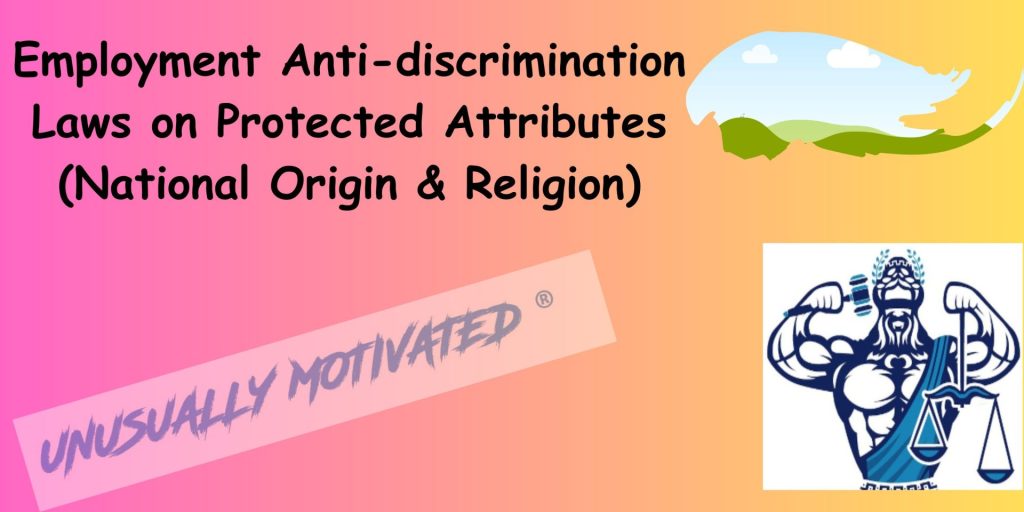From Miletti Law®, the home of the #UnusuallyMotivated movement, we highly appreciate that you, our unusually motivated® readers, take the time to read our trustworthy & distinctive content that aims to keep you informed and educated about the diverse legal and non-legal issues that affect you or your businesses. As usual, our content is featured as videos that are posted on our YouTube Channel https://www.youtube.com/channel/UCtvUryqkkMAJLwrLu2BBt6w and blogs that are published on our website WWW.MILETTILAW.COM. We highly encourage you to subscribe to the channel and sign up for the Newsletter on the website to experience, firsthand, the unusually motivating effect of the knowledge bombs we drop.
This blog is a continuation and Part II of our sub-series on federal laws that are applicable to workplace harassment, discrimination, & retaliation issues in New York. In Part I of the sub-series, we hammered on six of these federal laws that include the Americans with Disabilities Act (ADA) (42 U.S.C. § 12101 et seq), Title VII of the Civil Rights Act of 1964 (Title VII) (42 U.S.C. § 2000e et seq.), the Pregnancy Discrimination Act (PDA), 42 U.S.C. § 2000e(k), the Fair Labor Standards Act (FLSA) (29 U.S.C. § 201 et seq.), Age Discrimination in Employment Act (ADEA) (29 U.S.C. § 621 et seq.), and the Equal Pay Act (EPA) (29 U.S.C. § 206(d)). Picking from here, we will continue hammering on more of these federal laws in this blog.
Uniformed Services Employment and Reemployment Rights Act (USERRA), 38 U.S.C. §§ 4301–4335.
Under this law, service members who complete their military service should be re-employed in line with the rate of pay, status, and seniority that they would have gained if they had remained employed in the military. Ideally, the federal law ensures that employees are treated without preferential treatment, but with service obligations equally to similarly situated employees. Accordingly, any form of discrimination based on present, past, and future service in the military is prohibited under USERRA.
Section 1981, 42 U.S.C. § 1981
This is another federal law under which race-based discrimination (interpreted to incorporate ancestry, ethnicity, and color) when in government related contracts, including employment ones, is being alleged or otherwise is outright prohibited. Under the law, the modification, performance, making, and termination of contracts, as well as the enjoyment of all conditions, privileges, terms and benefits of the contractual relationship are included as part of the phrase “make and enforce contracts.” However, employees can bring a Section 1981 claim although the law prohibits contract-based discrimination. In addition, based on past cases adopted as the due process, the law also prohibits alienage-based discrimination.
Immigration Reform and Control Act, 8 U.S.C. § 1324b(a)(1)(B), (a)(3)
While it creates financial and criminal penalties for employers who hire illegal aliens knowingly, employers are required to attest to the citizenship status of their employees under the IRCA. Accordingly, any form of discrimination against employees or applicants based on national origin (unless Section 703 of the Civil Rights Act of 1964 (42 U.S.C. § 2000e-2) covers the national origin discrimination, or based on an individual’s citizenship status (if they are protected persons under the statute) is prohibited.
Patient Protection and Affordable Care Act (ACA), 42 U.S.C. § 18116
When it comes to retaliation, ACA offers individuals with whistleblower provisions that preclude health insurance issuers, group health plans, and employers from retaliating against persons who participate in protected activity under this law. Under ACA, protected activity encompasses receiving subsidies or tax credits via government healthcare exchanges and reporting possible ACA violations.
Family and Medical Leave Act (FMLA), 29 U.S.C. §§ 2601–2654
Under this federal law, eligible employees of covered employers are entitled to take unpaid, job-protected leave for specified medical and family matters, but with an application of similar terms and conditions of group health insurance coverage as if they had not taken the leave. Further, it is illegal for an employer to deny, restrain, or interfere with the exercise or the attempt to exercise any right specified under the law. Moreover, the law makes it unlawful for an employer to take adverse employment action against any employee who participates in conduct that it protects.
Employee Retirement Income Security Act (ERISA), 29 U.S.C. § 1140
Finally, any form of interference with ERISA employee benefit plans, retaliation for the exercise of rights, under ERISA, and benefits is prohibited by Section 510 of ERISA. Notably, the prohibition is also applicable to actions that affect a single or multiple individuals, both vested & unvested benefits, and employee welfare & pension benefit plans. Section 510 also provides that employees should be able to exercise their rights and claim benefits under the law without fearing the reprisal and interference of their employer.
In Part III of this sub-series, we will focus on whether any of these federal laws have coverage (on both employees and employers) and individual liability standards in New York.
Till then stay tuned and, as usual, always be #UnusuallyMotivated! In the interim, reach us with questions or comments on our website at the Contact Us page!
Always rising above the bar,
Isaac T.,
Legal Writer & Author.
 Professional Legal & Business Services And Representation - English & Espanol!
Professional Legal & Business Services And Representation - English & Espanol!

 314-648-2586
314-648-2586 CALL US NOW
CALL US NOW








